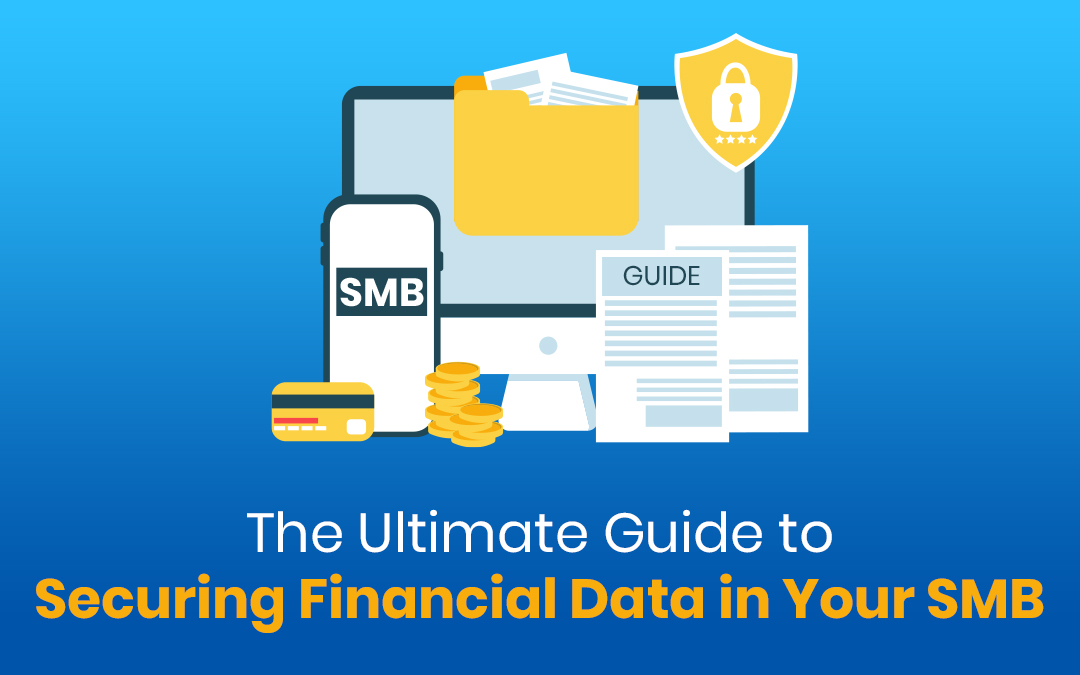
For most small and medium-sized businesses, financial data security becomes a key target for cyber threats, with even the smallest vulnerability leading to dire consequences. To secure financial data, business owners shouldn’t just focus on compliance—it's about protecting clients, business reputation, and future growth.
Employing the right measures, you reduce the risk of data breaches and protect your sensitive information. Actionable strategies to secure your SMB's financial data will help ensure compliance with industry standards and build a strong defense against potential threats.
Strengthen Access Control
The likelihood of unauthorized personnel accessing your financial records is decreased by effective access control procedures. Security may be further improved by implementing role-based permissions and routinely evaluating user access privileges. Auditing access logs so you can identify unusual activity early and take corrective action before it leads to a breach.
Restrict User Access
Give permission to view financial data only to those workers who need it. Keep financial data separate from other business data, and make sure that access is given according to job duties. Apply the least privilege principle, which states that workers should only be granted the minimal amount of access required to carry out their duties.
Implement Multi-Factor Authentication
Anyone accessing sensitive data must authenticate themselves using more than just a password, thanks to multi-factor authentication (MFA). Even if a password is hacked, this additional security measure prevents unwanted access.
Unlike two-factor authentication (2FA), which typically uses only two verification forms (such as a password and a text message code), MFA can involve multiple verification methods, including biometrics, physical keys, or app-based authentications. The flexibility of MFA allows for a more robust defense against modern threats, as it provides more layers that hackers would need to bypass, making it significantly harder for them to gain unauthorized access.
Use Strong Password Policies
Ensure your employees use strong, unique passwords. Encourage them to avoid easily guessed passwords, such as birthdates or common words. Utilize password management tools to generate and store complex passwords and enforce regular password updates to maintain security.

Encrypt Financial Data
Encrypt all financial data transfers from start to finish. By reducing the possibility of interception, this kind of encryption guarantees that your data is safe from the time it leaves your system until it gets there.
Encrypting data while it's being stored, whether on your servers or in cloud storage, is known as encryption at rest. Make use of strong encryption techniques to guarantee that, even in the event that storage is hacked, the financial data cannot be accessed by unauthorized personnel.
Regularly Update Software and Systems
Outdated software can contain vulnerabilities that cybercriminals exploit to gain access to sensitive financial information. Ensuring that all software and systems are updated is crucial for protecting your SMB. Update your invoice scanning software solution to the latest version to patch vulnerabilities and ensure compatibility with modern security protocols. This reduces the risk of cyberattacks targeting outdated software and helps maintain the integrity of your financial data.
Patch Management
Regularly update operating systems, financial software, and any other tools that handle sensitive information. Many cyberattacks exploit known vulnerabilities, so staying current with patches is an effective way to mitigate risks.
Automate Updates
Automatic updates ensure that no critical security patch is missed, reducing your business's exposure to potential threats.
- Configure automated update checks to ensure every software version is verified as up-to-date, minimizing the risk of overlooked vulnerabilities.
- Schedule updates during off-peak hours to prevent disruptions to normal business operations, ensuring updates are applied seamlessly without affecting productivity.
- Utilize centralized update management tools to streamline the process across all devices and systems, providing better oversight and consistency in software security.
Backup Financial Data Securely
A robust backup plan ensures you can quickly recover financial data without significant losses or disruptions. Choose a secure backup solution that supports encryption and adheres to industry best practices.
Consider using cloud-based services that offer redundancy, ensuring your data is backed up in multiple locations to prevent loss. Prevent data loss by implementing Microsoft 365 backup that securely stores your emails, documents, and other important data. This includes leveraging automated backups that maintain a secondary copy for redundancy in emergencies.
Implement a Backup Schedule
Regularly backup financial data according to a fixed schedule. Perform daily incremental backups for current data and full weekly backups for long-term records. Test your backups periodically to ensure they are functional and accessible when needed.
Train Employees on Data Security
Without proper training, even the most secure system can be compromised by human error. Phishing is a common tactic used to gain unauthorized access to financial data. Train employees to recognize phishing emails, including suspicious links and attachments. Encourage them to verify the legitimacy of any request for sensitive information before responding.
Establish Security Protocols
Create a guide for your employees detailing how to manage data securely, including rules for access, sharing, and storage. Reinforce these protocols regularly to ensure they are followed consistently.
- Establish clear guidelines for password management and secure authentication practices.
- Define procedures for reporting and responding to suspected data breaches.
- Set up rules for safely handling, transferring, and storing financial data across devices and networks.
Simulated phishing attempts and data breach scenarios can help identify vulnerabilities in your data security practices and improve your team's awareness.
Conclusion
Strengthening access control, encrypting data, keeping software up to date, ensuring reliable backups, and educating your employees can protect sensitive information from evolving cyber threats. Every measure you take enhances your business's resilience against data breaches.
Your financial data is one of your most valuable assets—securing it isn't just about staying compliant. It's about safeguarding the trust you've built with your customers. A proactive approach that includes these strategies will provide a solid foundation for your data security efforts, keeping your SMB safe from current and future threats.
Share this post
Leave a comment
All comments are moderated. Spammy and bot submitted comments are deleted. Please submit the comments that are helpful to others, and we'll approve your comments. A comment that includes outbound link will only be approved if the content is relevant to the topic, and has some value to our readers.

Comments (0)
No comment